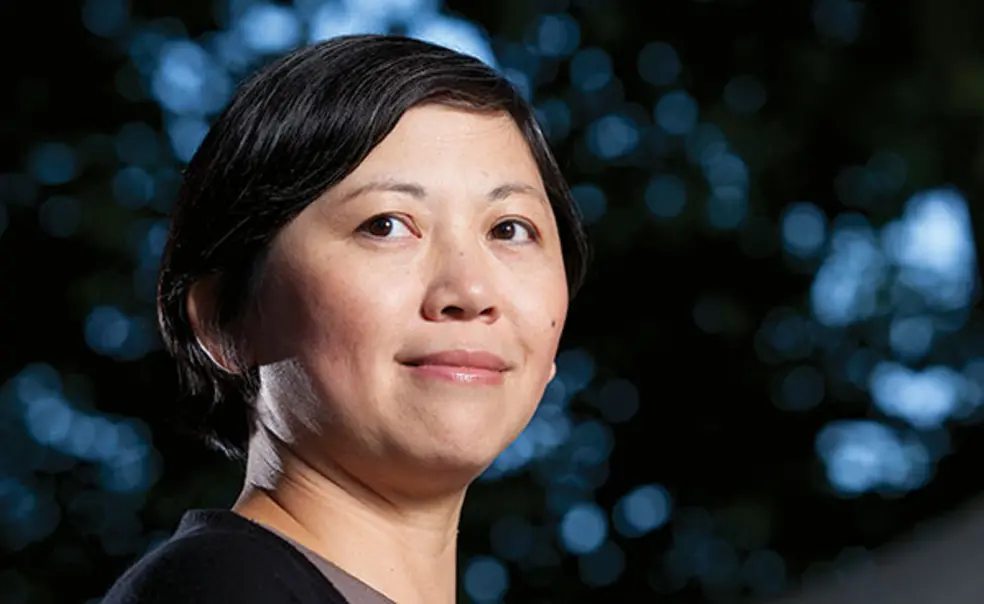Creative Writing: Life, By the Book
Writer Yiyun Li describes how she found purpose and solace in ‘the land of stories’
There was no library that novelist Yiyun Li was permitted to visit as a young child. She was raised in Beijing during the final years of the Mao regime, and the government tightly controlled what books were available to the public. It wasn’t until middle school that she finally gained access to a small library — and quickly devoured everything. “I had a hunger for so long, and all of a sudden I had all these books,” says Li, who became a professor of creative writing at Princeton in 2017.
Books transformed her life — carrying her from a budding career in science to one as a flourishing novelist — and eventually helped save her life when she was suffering from suicidal depression. In Li’s latest work, a memoir titled Dear Friend, from My Life I Write to You in Your Life (Random House), readers experience, between glimpses of her time in China and as an immigrant in the United States, the reaffirming power of books.
Li decided at age 10 that she wanted to live in the United States, and the way to get here was to excel academically. After a compulsory year in the People’s Liberation Army — during which she often carried a copy of James Joyce’s Dubliners — she completed college at Peking University and enrolled at the University of Iowa for graduate work in immunology. Once there, she grew intrigued by the university’s writing program, considered the best in the nation. “Someone said, ‘Everyone in town is writing a novel,’ and I thought, ‘How interesting. I should try that, too,’” she says.
Though her written English was still unpolished, she was accepted into the writing program and earned an M.F.A. after finishing a master’s degree in science. Often writing from midnight to 4 a.m. while working in a lab during the day, Li completed a short-story collection, A Thousand Years of Good Prayers (Random House). The book’s 10 stories, set in China and among Chinese Americans in the United States, explore the effects of Communism and the role of fate in the lives of a wide variety of characters, from a recluse who counts the grains of rice on his chopsticks to a boy who so resembles Chairman Mao that he is chosen as a Mao impersonator. The collection won the PEN/Hemingway Award and several other prizes.
“Bad things happen — wars, plagues, parents abandoning their children, the heartless preying on those with hearts — and no one, not a human or a god, will intervene.”
From Kinder Than Solitude by Yiyun Li
Her 2009 novel, The Vagrants, is set in a Chinese provincial town named Muddy River where a brutal public execution of a counterrevolutionary takes place. In 2010, Li was chosen for The New Yorker’s list of best young writers and was awarded a MacArthur Foundation “genius” fellowship, which cited her “intimate and elegantly constructed portraits of people largely ignored by history — Chinese nationals as well as expatriates in the United States.”
Three friends are haunted by their childhood in China — and the mysterious poisoning of one of their playmates — in the novel Kinder Than Solitude (Random House), published in 2015. One passage lays out the novel’s disquieting theme: “Bad things happen — wars, plagues, parents abandoning their children, the heartless preying on those with hearts — and no one, not a human or a god, will intervene.”
I Write to You in Your Life, Li’s first book of nonfiction, interweaves reflections on the struggle with depression that landed her in the hospital with an homage to writers whose works provided a lifeline. “I am aware that, every time I have a conversation with a book, I benefit from someone’s decision against silence,” she writes. She found particular comfort reading the letters and journals of fellow writers. “Marianne Moore would write to Elizabeth Bishop and say, ‘We are devastatingly lonely here.’ It helped me to know that these moments happened in other writers’ lives, and I’m not alone in feeling that.”
Li writes movingly of her friendship with the late Irish author William Trevor, which was sparked by a fan letter she sent to him. Visiting him near the end of his life, she muses of their bond, “We are solitary travelers, having crossed paths in the land of stories.”












No responses yet